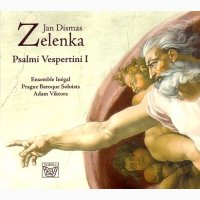Texte paru dans: / Appeared in: Nibiru 01612231 |
|
|
Reviewer: Bertil
van Boer
About 1726 Jan Dismas Zelenka,
the Kapellmeister at the Dresden cathedral, began a series of three volumes
of Psalm settings for Vespers, meant to be a compendium of works that would
be useful over the course of time. The first volume, completed that year,
includes a flurry of works composed in 1725, probably within the span of
only three months during the fall. It was intended that these compositions
would have been performed en concert in one go, a sort of complete program,
ending with the De profundis clamavi, a work that appears as the last work
on the disc but is of uncertain date, reflecting as it does a revision of a
work from the year prior.
The music of these Catholic
works is every bit the equivalent of the cantata music we usually associate
with Bach, and it is no wonder that this composer was so much interested in
becoming Zelenka’s successor in Dresden. That would have been a step up from
his duties (often tortuous in and of themselves) in Leipzig, as the Saxon
capital was a more cosmopolitan place. It boasted better organs, a more
expanded choral tradition, and finally a much better professional orchestral
ensemble. That it was Catholic and Bach was not appears not to have
mattered. It offered many more opportunities musically. Of course, Bach did
not achieve his ambition, but perhaps the reason why can be found a bit in
these works, here spread out over three discs. This first one contains the
earliest works by the composer, and one can count one modern premiere, the
Confitebor (ZWV 72). All but one of the seven works are in multi-movement
format; only the Laudate pueri (ZWV 82), is in a single large-scale
movement. This is a spare piece, opening with a bass solo above a walking
basso ostinato before the entrance of the upper choral voices. These two
groups have a nice duet that merges towards the end in a conflation of good
choral homophony. The Magnificat as a genre is usually of major proportions,
but here it is only three short movements. The bulk of the text is condensed
into the first, with its martial opening and flashy trumpet outbursts. The
fanfares are actually in the bass part and strings, which makes a rather
nice orchestrational change. Only at the fecit potentiam do the brass repeat
these. The counterpoint is quite complex at times, but it can also be
gentle, such as the stately second movement. Of course, the Amen is a
beautiful piece of counterpoint, a fugue that is worthy of Handel in its
broad scope.
The In exitu Israel is filled
with swirling sequences in the opening chorus, with lots of suspensions,
syncopations, and choral expostulations. The doxology begins with ethereal
floating solo voices, which then devolves into a particularly gnarly
chromatic fugal Amen. The Dixit Dominus has a certain Vivaldian tone in the
opening movement, with its unison string accompaniment and static soprano
line that soars above the sequencing. The De torrente rolls along in the
scalar bass line, though the tenor has a more sedate tune—that is, until he
occasionally breaks out into coloratura. The long Confitebor begins with
spare choral counterpoint that slowly unfolds, only to continue on into a
rather lively aria for the bass with swirling sequences in the strings and
doubled oboes. The Redemptionem misit is a soft lament with muted strings,
while the following pair of choruses are written with a sense of powerful
purpose. The doxology concludes with a particularly difficult fugue. The
Beatus vir is composed of various contrapuntal movements, ranging from the
suspensions of the Peccator videbit to the spare fugal Amen. The final work
on the disc is the De profundis clamavi, which begins positively funereal in
tone, with a slow marching bass line and the strings building up slowly with
countermelodies, before the bass solo trio begins to weave their lines about
each other. The Si iniquitatis even has a brief moment of chant before the
mournful chorus that marches slowly to its solemn close. The music is effective and moving. What does it justice, however, is the excellent performance by the choral group Ensemble Inégal, whose clarity of diction is matched only by the broad, sweeping textures they achieve. In the ethereal portions, they are light and clear, but in the fugues each of the lines comes out distinctly. The Prague Baroque Soloists blend well with the vocal ensemble, and the tempos are generous where necessary, but implacable when Zelenka wishes a steady and forceful foundation. This is an excellent disc and one that displays the power and beauty of Zelenka’s talent for sacred music. It would be hard to see how Bach might have competed here, but it is well known that he found Zelenka’s music moving and first-rate. This disc surely proves it. Highly recommended.
| |
|
|
|
|
|
|
|
Cliquez l'un ou l'autre
bouton pour découvrir bien d'autres critiques de CD |
|




